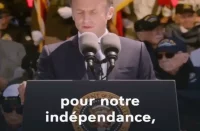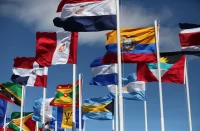The carnage in Libya continues. In the last two weeks NATO bombardment of Tripoli has intensified. Economic sanctions have created gas and food shortages throughout the government controlled parts of the country…
The French and British have now inducted helicopters into the air power they are deploying theoretically to protect the civilian population from attacks by Gaddafi forces but in practice to eliminate Gaddafi and his cohorts as and when they are located within what could be construed as a legitimate military target. The communications network has broken down and central control is now difficult to exercise. It would be safe to say that the back of the Government forces has been broken
While there have been no large scale defections from the Gaddafi camp, Shokri Ghanem, the oil minister and former Prime Minister, a prominent figure left Libya for Tunisia last week presumably after being offered the same immunity from prosecution as was offered to Musa Kusa, the foreign Minister who is said to be providing valuable information to his British hosts.
These developments explains why Gaddafi’s Prime Minister, Mahmoudi in a news conference in Tripoli called for a ceasefire and for negotiations with the rebels. Earlier his spokesman has offered to withdraw forces from all cities provided the rebels do likewise as a prelude to negotiations for a settlement. Mahmoudi was clear that his call for a ceasefire did not mean that Gaddafi would step down but there were other reports suggesting that the end product of the negotiations would be that Gaddafi would become a figurehead while power was exercised by the government that emerged from the negotiations and would in all probability be dominated by nominees of the rebel TNC. The PM’s offer, also transmitted in a letter sent to western governments, was promptly rejected by the White House spokesman as not being sufficient because it was not accompanied by action. This situation is not likely to change when the African Union’s representative President Zuma visits Libya this week to continue the AU’s so far unsuccessful mediation efforts.
These ceasefire offers currently dismissed by the West have been made despite the fact that the ICC prosecutor has already moved the ICC two weeks ago to seek arrest warrants against Gaddafi, his son Seif Islam and his brother in law and chief of security Abdullah Sanussi. The court will probably approve these warrants of arrest within the next week or so. As and when this happens Gaddafi and his family will have even less incentive to accept any proposals that entailed their relinquishment of power and departure from Libya. In an interesting exchange on the subject the State Department spokesman on the 27th May said that “I don’t know if it’s up to the international community given what Qaddafi’s done against his own people to prepare him any kind of easy exit or in any way some kind of golden parachute to leave Libya. We’re consistent in calling for his accountability for human rights abuses and that he is delegitimized as a leader for having used violence against his own people, and those are clear.”
At the same time however there are reports that the Obama administration is now talking to countries that have had cordial relations with Gaddafi in the past and which are not party to the ICC in the hope that a deal could be worked out for Gaddafi and his family members to be granted asylum. For the time being however a solution seems some time away with Obama saying, after his meeting with Prime Minister David Cameron, that the change in Libya will be a gradual process. I think that while President Zuma will not be able to get any positive response from the rebels or the western governments for any proposal that would leave Gaddafi in power he may during his visit to Libya be able to get Gaddafi to accept an asylum offer from one of the African countries.
It is evident that now the West will not rest till Gaddafi is ousted. One can only hope that this will happen quickly and will bring the agony of Libya to an end. One can also only hope that after Gaddafi’s departure the substantial differences within the rebel ranks will be resolved peacefully and that the jockeying for power will not set off another round of fighting.
What is also evident however is that the Libyan case has torn to shreds the respectability and acceptability of the “Responsibility to Protect” concept. There is no doubt that the origin of this concept owed much to the manner in which the world watched helplessly as massacres occurred in Rwanda in 1994 and then in Yugoslavia. Both Gareth Evans of Australia and Bernard Kouchener of France worked hard to convince the world community to take remedial action. It was as a result of their efforts that in 2001 the Report of the International Commission on Intervention and State Sovereignty was adopted. It was in this report that the phrase “Responsibility to Protect” was coined and it was this concept that was endorsed at the UN World Summit of September 2005. It theoretically imposed upon the international community the duty to protect civilians from “genocide, war crimes, ethnic cleansing and crimes against humanity” if the national authorities were manifestly failing to do so. But it also emphasised that the international community’s initial efforts must be to use non coercive and non military means to persuade the national authority to protect its population and to resort to the use of force under Chapter VII of the UN charter only after all peaceful means had failed and after the Security Council had authorised it.
Before the intervention in Libya and the Ivory Coast the doctrine had been implicitly invoked in 1999 when an air war was unleashed against Serbia to stop the massacre in Kosovo. This was done without UN sanction but in a sense it was endorsed retrospectively when the UN sanctioned an international tutelage for Kosovo. There were always question marks about the validity of the concept. This after all had not been made into an internationally binding treaty. It was evident that it could be invoked only by the powerful against the weak states and there were apprehensions that this would be used to justify interventions that had more to do with national interests than with humanitarian causes. In a debate on Resolution 1894 (2009), which established the Security Council’s regulatory framework on the protection of civilians in armed conflicts the concept of the responsibiliity to protect was reaffirmed but in the debate the Cuban delegate raised what appeared to be pertinent questions –questions that suggested the need for making the concpet a part of a binding treaty before its invokation was permitted. He said ““Who is to decide if there is an urgent need for an intervention in a given State, according to what criteria, in what framework, and on the basis of what conditions? Who decides it is evident the authorities of a State do not protect their people, and how is it decided? Who determines peaceful means are not adequate in a certain situation, and on what criteria? Do small States have also the right and the actual prospect of interfering in the affairs of larger States? Would any developed country allow, either in principle or in practice, humanitarian intervention in its own territory? How and where do we draw the line between an intervention under the Responsibility to Protect and an intervention for political or strategic purposes, and when do political considerations prevail over humanitarian concerns?”
It has been argued that virtually no efforts were made to dissuade Gaddafi from pursuing a course of crimes against humanity against his own people. It could be argued that Gaddafi’s bombastic threats to treat the rebels like rats and to exterminate them and the threat of an unfettered military attack against Benghazi made it difficult to hold off on military action. But there is little that can be said to answer the charge that Gaddafi could be attacked while Yemen and Syria had to be spared because (a) Gaddafi was loathed by his neighbours and (b) because he had surrendered his potential nuclear capabilities in a bid to repair his relations with the west and was therefore virtually defenseless.
It appears that now the Obama administration is leaning towards seeking UN Security Council action on Syria along the lines of the resolution that was adopted on Libya. There is no chance however that either China or Russia as veto wielding members of the security Council will allow the passage of such a resolution. Indeed even among the non permanent members there would be little enthusiasm for any such resolution particularly since there is not a snow flake’s chance in hell – to use a colourful phrase –that the Arab League or any other regional body will endorse such action.
The concept of responsibility to protect is clearly an infringement of the basic principles governing inter-state relations, viz: that no state has the right to interfere in the internal affairs of another state. This does not mean that it is not a laudable concept. Human beings deserve protection from genocide etc. but this can be done only if all states agree to this infringement of sovereignty in a treaty such as was used to create the International Criminal Court (ICC). In fact the acceptance of the jurisdiction of the ICC is a necessary precondition in my view for the application of this concept because that alone would ensure that the individuals responsible for genocide etc. could be held accountable. It is of course well known that many countries notably the United States have not become party to the ICC.
Source: Strategic Culture Foundation














Obama shut the fuck up. God is the only jugje and only decider .